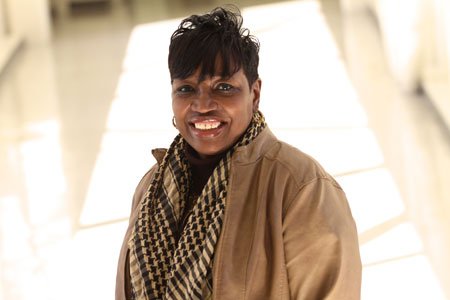Averl Anderson didn’t know cancer was a part of her family history. It wasn’t until later, after she was diagnosed with an aggressive form of breast cancer and when a niece also received the diagnosis that Anderson realized how devastating the illness can be.
“When I was a child, you didn’t listen to adult conversations and also it was a rule that everything that’s said inside the house stays inside the house,” she said. “When I was diagnosed I was in denial. I was overwhelmed, shocked and in fear and I didn’t’ know how to tell my family or my children and I didn’t know if I was going to die or not.”
It’s been five years since Anderson’s first diagnosis and she has contended with a recurrence of the disease. However, it hasn’t shaken her faith.
She says she couldn’t let cancer control her. “I walked everyday and I just wasn’t going to sit in the bed or in some chair,” Anderson said.
In 2009, Anderson, a minister, became involved in a federally funded clinical study, which she says helped make her survival possible. She understands that many African-American women remain hesitant to take part in clinical trials, but doing so has changed her life and inspired her to become involved in a campaign called, “I’m In,” which was started earlier this year by the Washington, D.C.-based Pharmaceutical Research and Manufacturers of America (PhRMA) and the National Minority Quality Forum.
The campaign began as a means to address the diversity in clinical trials and “I’m In” researchers are helping to find better treatments to fight diseases that affect certain populations disproportionately.
According to PhRMA officials, black women are twice as likely to lose their battle with breast cancer as their white counterparts. While African-Americans make up 12 percent of the U.S. population, they represent just five percent of clinical trial participants, something that officials say, must change.
“There’s a need for these clinical trials,” Anderson said. “I was a participant of a clinical trial and a clinical trial drug that greatly improved my cure rate. For African-Americans it’s especially important to be involved.”
Jocelyn B. Ulrich, the director of scientific and regulatory affairs at PhRMA, says a key part of the “I’m In” campaign is reaching African-Americans.
Ulrich says there are literally thousands of clinical trials going on across the country, which is important in finding the right treatments and medicines.
“There are a number of misperceptions and some believe that a clinical trial is a last resort and some believe that you’re not getting treatment that you’re only getting a sugar pill, and that’s not true,” said Ulrich, whose served as chair of the membership and outreach subcommittee of the Mid-Atlantic Women in Science Committee since 2012.
“The scientific process is long and complex, but we need to understand how medicines work in healthy patients, those who are sick and those who are very, very sick,” she said.
Officials at the nonprofit Living beyond Breast Cancer said there are a number of trials geared toward African-Americans including one by the Dr. Susan Love Research Foundation and the Beck Research Institute’s online study to examine breast cancer causes, treatment and prevention; the “Jewels in our Genes: An African-American Family Study,” where researchers seek young black women with multiple family members who have been diagnosed with breast cancer to help them to discover unique genes that may ultimately help lead to better research and treatments.
Because blacks are underrepresented in clinical trials, the “I’m In,” campaign is important, health officials said.
A campaign spokesperson said medical innovations and new, effective treatments have the power to change lives, but these breakthroughs don’t happen on their own.
Statistics show that African-American men are twice as likely to die from prostate cancer as whites, but blacks represent just four percent of prostate cancer clinical trial participants.
“They call me ‘1,000 questions Averl’ because I ask a lot of questions which is very important,” Anderson said. “There’s a lot of terminology you don’t understand and doctors are busy and they don’t always explain things [so that] you can understand. You need someone to sit down and tell you the nuts and bolts of this thing; the elephant in the room is ‘am I going to die?’ My family felt the same thing; we all thought it but nobody would say it; there are a lot of questions that need to be answered; I’m at Stage 4; what are my options after that, that’s where ‘I’m In’ comes in because they’re focused on increasing clinical trial participation. It worked well for me.”
For more information about clinical trials and the “I’m In” campaign, visit: www.JoinImIn.org.
